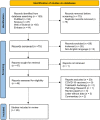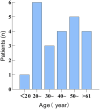COVID-19 and Sudden Sensorineural Hearing Loss: A Systematic Review
- PMID: 35572936
- PMCID: PMC9096262
- DOI: 10.3389/fneur.2022.883749
COVID-19 and Sudden Sensorineural Hearing Loss: A Systematic Review
Erratum in
-
Corrigendum: COVID-19 and sudden sensorineural hearing loss: a systematic review.Front Neurol. 2023 May 9;14:1208650. doi: 10.3389/fneur.2023.1208650. eCollection 2023. Front Neurol. 2023. PMID: 37234788 Free PMC article.
Abstract
A growing body of evidence suggests that patients with the 2019 Coronavirus disease (COVID-19) have a risk of developing sudden sensorineural hearing loss (SSNHL). The pathogenesis of COVID-19-related SSNHL remains unclear. This systematic review examined whether COVID-19 causes an increased incidence of SSNHL and the clinical characteristics of patients with COVID-19-related SSNHL according to the Preferred Reporting Items for Systematic reviews and Meta-Analyses (PRISMA) guidelines. SSNHL usually developed between a few days and 2 months after the diagnosis of COVID-19, and a proportion of patients developed it before the diagnosis of COVID-19. The literature is inconsistent regarding whether COVID-19 causes an increased incidence of SSNHL, and this matter remains unclear. This review included 23 patients with COVID-19-related SSNHL, all adult patients with an average age of 43.1 years. Of these patients, 60.9% had accompanying tinnitus symptoms. Glucocorticoids are the preferred medication to treat COVID-19-related SSNHL. Intratympanic administration may be considered to reduce the side effects of the drug. Hearing tests are suggested when hearing loss is suspected in COVID-19 individuals, and if SSNHL is detected, prompt and aggressive treatment is vital. Large-scale, multicenter research on the pathophysiology, treatment, and prognosis of COVID-19- related SSNHL should be conducted in the future.
Keywords: COVID-19; SARS-CoV-2; glucocorticoids; incidence; inner ear; sudden sensorineural hearing loss.
Copyright © 2022 Meng, Wang, Sun and Zhu.
Conflict of interest statement
The authors declare that the research was conducted in the absence of any commercial or financial relationships that could be construed as a potential conflict of interest.
Figures




References
Publication types
LinkOut - more resources
Full Text Sources
Miscellaneous

